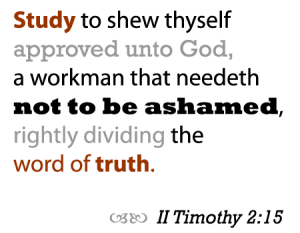ADJECTIVAL USE IN JEREMIAH 26:10 AND REVELATION 1:10
I was in the Spirit on the Lord’s day, and heard behind me a great voice, as of a trumpet, (Revelation 1:10).
When the princes of Judah heard these things, then they came up from the king’s house unto the house of the LORD, and sat down in the entry of the new gate of the LORD’s house. (Jeremiah 26:10).
Notice in the passage above that the word of God says both “house of the LORD” and “the LORD’s house“. If we follow strict Hebrew language usage, God’s word in Hebrew cannot say “the LORD’s house.” The King James Version does it by the required contextual translation into English. To end the sentence in Jeremiah 26:10 with “LORD” would confuse the “gate” with “house”.
There are differences between Hebrew and Greek grammar on this issue. The Hebrew has no adjectives. If a descriptive term (adjective) is used, such as “LORD’s” the only way to grammatically express it in Hebrew is by using two nouns, such as “the day of the LORD”. The Hebrew speaker, if he wishes to say “the LORD’s day”, must say “the day of the LORD.”
The Greek does have adjectives. But the differences of possessive use in each language have nothing to do with the point at hand. Regardless of the Hebrew/Greek, the context of the King James Bible has doctrine for the common man that the scholar will never find in his original language studies.
Notice house is italicized in the KJV to note that the word was inserted by the translators to complete the readability, and justifiably so, because the context of Jeremiah 26 shows that the words are all spoken “in the house of the LORD.”
It is interesting that in the English translation of “house of the LORD” there is emphasis on the “LORD” while the “LORD’s house” puts emphasis on the “house.” Thus, the paltry “king’s house” is of no comparison to the “LORD’s house.” They went “up” from the king’s house to the LORD’s house. A king’s house is always below the LORD’s house. (Modern versions lose this distinction.)
John could have used “the Lord’s day” to refer to a particular day of 24 hours as belonging to worship of the Lord. However, for him to do so in Revelation 1:10 would go against not only Old Testament and New Testament example and doctrine, but also contrary to his own previous descriptive of the “first day of the week” in John 20:1 and John 20:19. The context of the Book of Revelation is an emphasis on the “Lord’s DAY in contrast to the previous age when man had his “day.”
The term “Lord’s day” in Revelation 1:10 is another one of many places in the Bible that reveals whether the interpreter is ignorant of the context of the Bible, or is depending on traditions of men to tell him what the Bible means.
The Bible student knows that a believer in this age is “in the Spirit” every moment. (Romans 8:9). The interpretation of Revelation 1:10 that refers to John being “in the spirit on a Sunday” is no interpretation at all. It stands on the uncertain grounds of pagan heresy, tradition, and ignorance of the context of Bible doctrine.
We also need a word of balance. This study should not become a battleground with those who differ. If a Christian thinks he is keeping Sunday as “the Lord’s day” (a day to give extra duty to God) and he really observes it as to the Lord, we should not quarrel. We should rejoice that at least one day out of seven is dedicated. A difference of opinion or ignorance on this matter does not deserve starting a new denomination or switching churches.

